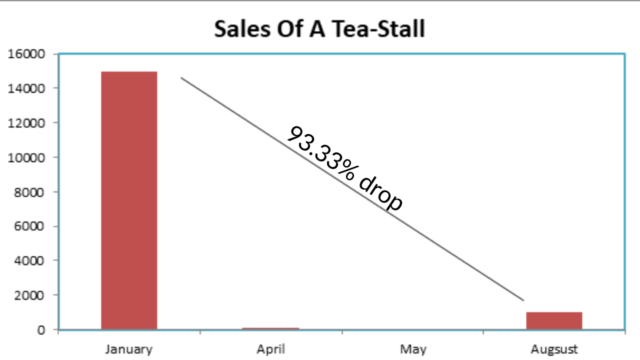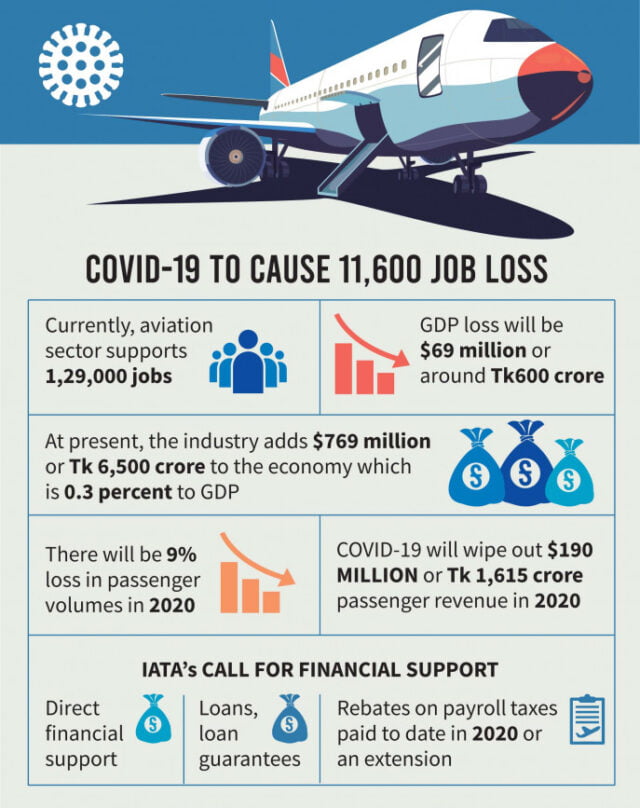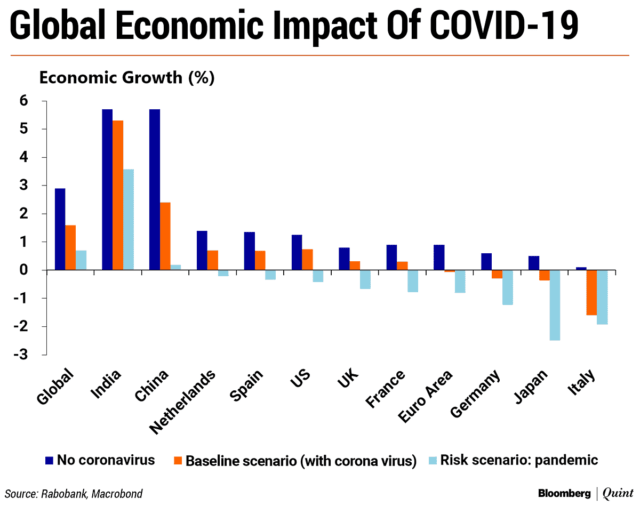The 2020 pandemic has had severe consequences on two imperative institutions of the society – one, it has exposed an extremely ill-equipped medical infrastructure and the other, it has struck the economy right at the roots.
The Indian economic sector is broadly divided into three sectors based on activity, ownership, and work conditions. The performances of these sectors are highly intertwined, as they get further divided into their respective sub-categories as shown below.
Though the RBI hasn’t released the GDP estimates of this year, the fact that our economy has suffered a tremendous setback due to the pandemic at an extremely vulnerable stage where the economic growth had already slowed down, doesn’t come in as a shocker at this stage.
Each and every sector has been affected by a sudden dip in demands, resulting in the stagnancy of cash flows. While the government Of India did try to revive the situation with a package approximately worth 21 billion dollars, it was a hasty move that hasn’t had too much of an impact on the current situation.
While the above-mentioned facts are mostly known to us, discussions have risen on another interesting angle of the current situation.
Ever since the lockdown, private sectors have continued operation through remote working. Under the current circumstances, millions have lost their jobs across all sectors of the economy. And the practice of remote working amongst the white-collar workers has surprisingly had a huge role to play on this sudden unemployment.
Remote Working And The Invisible Office Economy
One-third of the GDP of the Indian economy comes from the unorganized sector and the lockdown substantially crushed this sector, leaving them with no source of income. But how did the lockdown induced practice of remote working play a role in it?
Let’s take a simple example here. A tea stall outside a particular office building caters to the needs of say 30% of the population in there. Assuming this population to be around 2500 in number, the tea-stall sells at least 700 cups of tea every day, five days a week. Considering each cup costs Rs. 10, he would make an estimate of around Rs. 15,000 from selling tea alone each month.
However, due to the pandemic, his sales suddenly plummeted to Rs. 100 within the very first month of the outbreak. Eventually, this went further south till it reached 0 once the complete lockdown was imposed forcing people to stay at home. And now, even when the activities resumed under the ‘Unlock program’, his sales were restricted to a bare minimum of Rs. 1000 per month, thus recording a drop of 93.33% over the last six months.

Now apply this example to the various other workers who have been facilitating a population of 150 million white-collar workers, on a daily basis across the nation – canteens, tea-stalls, cobblers, newspaper stands, and the list continues. And this unorganized sector of labor constitutes 94% of the Indian economy.
Some of these people started selling other essential items during lockdown to survive this phase, but a majority of them lost their sole source of income overnight.
Also Read: Asian Paints Hikes Salaries Of Workers Despite The Economic Slowdown
Other Areas That Have Been Affected
The invisible office economy comprises of a number of expenses which have completely been curbed due to the remote working culture being adopted as the new work norm.
Some common examples would include travel costs, hotel expenses, stationery items, security, and housekeeping staff. For the last few months of lockdown, the organizations haven’t used their services.
The Wall Street Journal reported that an estimated 2 trillion dollars in corporate travel would not happen this year, in the United States of America.
According to an article on Bloomberg Quint, around 400,000 have either lost their jobs or have been notified about it beforehand in the aviation industry globally, due to the pandemic. And this is just one of the sectors from our above-mentioned list of examples.

The sudden stagnancy in demand has highly affected these sectors of the organized workforce as well. Thus, while the white-collar workers are themselves walking on thin ice stuck in this dwindling economic situation, their new work culture has affected the stability of other sectors of the economy.
What Next?
The Unlock program commenced in India in the month of June and is being executed in phases in different parts of the country. Airlines, hotels, restaurants, and the like have resumed services on an extremely restricted basis.
However, most firms, including both large and medium-scaled, aren’t likely to resume operations from office before the end of this year. And even when they do, remote working will be given a higher preference since they need to cut costs and make up for the losses incurred during the pandemic.
Thus the invisible office economy will still be at the suffering end, even when the white-collar workers attempt at reviving the economy.
They are probably the worst-hit section in the current scenario, stuck amidst a cycle of nil to low demand due to the extensive reduction in the purchasing power of their target audience. And as per experts, the effects of this recession will take a good number of years to get evened out, let alone making profits anytime soon.
Image Credits: Google Images
Sources: India Today, Medium, Research Gate + More
Find The Blogger: @Sriya54171873
This post is tagged under: office economy, invisible, supporting economy to office, office goers, white collar jobs, unorganised sector around working from office, work from home, gdp, job losses, offices being shut, covid 19, pandemic, coronavirus, india, guards, cabs, travel, food, delivery, stationary, office equipment
Other Recommendations:
Visually Impaired, Declared Brain Dead Once, Azeem Bolar Is Now A Successful Counsellor & PhD








































It is a plandemic orchestrated by United nations and worls economic forum . By 2021 they begin the great reset .
Expect more millions to be jobless . No one is paying attention to the vaccine or what health hazard it can create .
It was bill gates who suggested lockdown and he is funding 5 companies to generate a vaccine which would earn him billions .
Goverments took action without logical thinking .
excellent lines